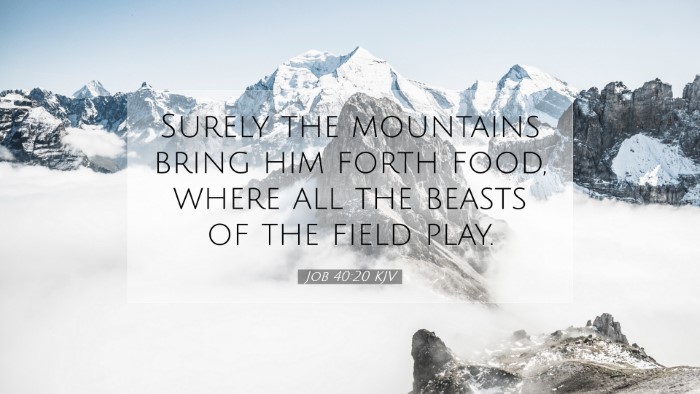Old Testament
Genesis Exodus Leviticus Numbers Deuteronomy Joshua Judges Ruth 1 Samuel 2 Samuel 1 Kings 2 Kings 1 Chronicles 2 Chronicles Ezra Nehemiah Esther Job Psalms Proverbs Ecclesiastes Song of Solomon Isaiah Jeremiah Lamentations Ezekiel Daniel Hosea Joel Amos Obadiah Jonah Micah Nahum Habakkuk Zephaniah Haggai Zechariah MalachiJob 40:20
Job 40:20 KJV
Surely the mountains bring him forth food, where all the beasts of the field play.
Job 40:20 Bible Commentary
Commentary on Job 40:20
Text of the Verse: "Surely the mountains bring him forth food, where all the beasts of the field play."
Historical Context
The Book of Job remains one of the most profound pieces of wisdom literature in the Old Testament, exploring the theme of human suffering and divine justice. Job, a man of great integrity and wealth, faces enormous suffering and loss. This verse appears in a section where God responds to Job, challenging his understanding of the universe and the nature of creation. The mention of mountains and beasts emphasizes the intricate balance of creation and the sustenance provided within it.
Commentary Insights
Matthew Henry
Matthew Henry draws attention to the grandeur of God’s creation as he responds to Job. He emphasizes that God’s provision is evident in the natural world, where mountains are depicted as a source of sustenance for various creatures. The mountains symbolize stability and strength, while the beasts represent the diversity of life. Henry observes that this verse highlights both God’s creative power and his ongoing care for his creatures, suggesting that even in the rawness of nature, there is a divine order at play.
Albert Barnes
Albert Barnes comments that the reference to mountains indicates their significance in the natural supply chain. He suggests that the phrase "bring him forth food" implies that the mountains themselves, through their characteristics and resources, provide for the animals that inhabit the fields around them. Barnes elucidates further that this distribution of food points to God's providential care over creation, suggesting that if God cares for the beasts, how much more should humans trust in His provision? The verse illustrates the interconnectedness of creation and God's sustaining power.
Adam Clarke
Adam Clarke takes an interpretative approach, analyzing the underlying implications of the verse. He discusses “the mountains” as symbols of abundance and fertility. Clarke posits that the phrase evokes imagery of a thriving ecosystem where various animals find refuge. He emphasizes that this serves a dual purpose: it acts as a reminder of God's greatness in providing for all life forms, and it challenges Job (and the reader) to reflect on their own place within God's creation. Clarke notes that this serves as a rebuke to Job's misunderstandings regarding divine justice and human suffering.
Theological Implications
The verse offers significant theological insights into creation and divine providence. The act of God sustaining life creates a theological foundation for understanding human suffering, as it attests to God's involvement with his creation. Furthermore, it addresses the misconception that suffering negates God’s sovereignty. Rather, the ecology depicted suggests a larger narrative where all creation operates under God's providence, even amidst human suffering.
Reflection on God's Sovereignty
This verse challenges believers to acknowledge God’s sovereignty, not only in their personal lives but in the natural order. The mountains are a testament to God’s majesty, illustrating that His authority extends over all creation. In recognizing the divine provision in nature, believers can cultivate a deeper understanding of trust in God’s plans for their own lives. This encourages a view that embraces divine mystery—accepting that God’s ways are beyond human understanding.
Encouragement in Suffering
For those experiencing suffering, the affirmation of God’s provision in the natural world serves as an encouragement. Just as the beasts are cared for, so too will God provide for His people. This reinforces the notion that God’s goodness and care are not dictated by earthly conditions but are constant and enduring.
Conclusion
Job 40:20 invites readers to explore the depth of God’s creation and His providential care over all living beings. Through insights from esteemed commentators like Matthew Henry, Albert Barnes, and Adam Clarke, we are reminded of the profound truths surrounding God's majesty and the nature of our relationship with Him. It encourages contemplation on the beauty of creation and the assurance of God’s continual sustenance, offering comfort to all who struggle in understanding their suffering within the tapestry of life that God intricately weaves.


